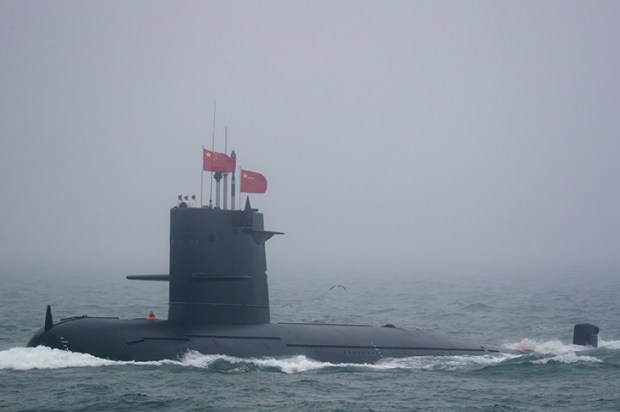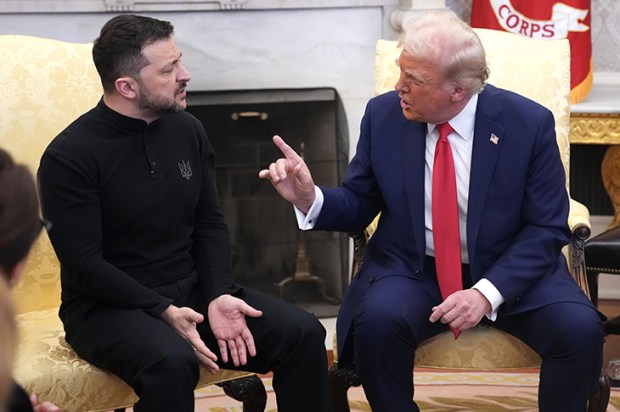Like the lowly lover on a willow pattern plate, Prime Minister Albanese – Handsome Boy – prepares for his nuptials, and the election, throwing around money as if it were confetti. In the distance three Chinese war ships fire shots, threatening the country as they sailed serenely on a blue glazed porcelain sea.
It’s an extraordinary moment in our nation’s history; the first time China has directed live fire at civilian airspace so far from China and so close to home. It won’t be the last. A day later, a Chinese fighter shot flares in front of an Australian surveillance aircraft.
The little the PM said about this act of aggression was too much for China which sneered that Australia had ‘hyped up’ the incident. The Chinese Ambassador didn’t see ‘why the Chinese side should feel sorry… or even apologise’. Of course not. The second coming of Donald Trump has ushered in an era of realpolitik where, as Thucydides observed, ‘the strong do what they can and the weak suffer what they must’.
What can the PM do? He only found out about the war ships after he was alerted not by Australia’s shamefully depleted defence forces but by a Virgin Australia pilot. It’s lucky it wasn’t Qantas or the staff would have spent 15 minutes on a ‘welcome to country’ before reporting the shooting had begun. Since then the navy has struggled to maintain surface combatants tracking the trio for want of supply tankers to replenish them.
How did it come to this? Less than three years ago, retired admiral Chris Barrie, a former chief of the Australian Defence Forces described climate change as the single biggest threat to Australia’s national security lamenting that Australia had ‘squandered two decades’ failing to ‘transition to a better energy base’ and warned, ‘If the next parliament fails to grapple with climate change effectively, we will not have the opportunity in 2025 to recover from this dire situation.’
So while Australia closed Liddell power station, cutting its coal-fired power capacity to 21GW, and China increased its coal-fired power by 214GW to 1230GW, Albanese flooded Chinese solar panel exporters with the taxes paid by Australian coal miners and converted vast tracts of land into unreliable power plants. On top of which China used Australian coal and the revenue from renewables to finance the expansion of its naval battle force to the largest in the world.
It didn’t happen overnight. China decided to modernise its navy after the1995-1996 Taiwan Strait Crisis when it was militarily outclassed by the US, but it wasn’t until Xi Jinping came to power in 2012 that he turbo-charged the expansion of the fleet. Since 2015, China has added 15 to 20 increasingly sophisticated warships each year, with 70 per cent of its battle force built since 2010. The transformation was dramatic. At the turn of the 21st century, China had 210 outdated ship. A quarter of a century later, it has the largest navy in the world in fleet size and although the US Navy is still more powerful, China is closing the gap with new aircraft carriers, amphibious assault ships, and guided missile destroyers each year. This aligns with Xi’s vision of a navy operating globally to protect its sea lines of communication and throw its weight around like it did in the Tasman Sea.
Australia, by comparison, has only 28 commissioned warships, only operates a limited number of surface combatants including three Hobart-class destroyers and seven Anzac-class frigates aged between 19 and 27 years and nearing the end of their operational life. As for the geriatric Collins-class submarines, most are semi-permanently in dry dock for repairs. And despite plans to double the number of warships in the fleet, the first new frigates aren’t expected before 2032.
Chinese belligerence wasn’t helpful to Handsome Boy’s chances of winning the next election, given that his great foreign policy achievement is meant to be the ‘stabilisation’ of relations with China. This didn’t deter the Chinese Ambassador to Australia from writing an article in the Australian titled, ‘China a willing AI partner in building bright new world’. In case anyone missed the point, China’s Global Times explained the next day that ‘some Western outlets’ interpreted the article as a response to Australia’s decision in early February ‘to ban the use of DeepSeek on government devices’ but taking ‘restrictive measures’ against AI ‘under the pretext of “security risks” was an attempt to “overstretch” the concept of national security and politicise trade and tech issues’. Lectures from China about the virtue of ‘openness and co-operation’ are a bit rich, coming from one of the most secretive countries on earth.
The ‘bright new world’ in which we find ourselves courtesy of Trump, Xi and Putin is one of land grabs and resource wars.
Beyond the Mother of Russia platitudes – imperialist/Soviet/post-Soviet propaganda to justify erasing the older, richer Ukrainian culture – Putin covets Ukraine’s extraordinary resources; not just the rare earths that have attracted Trump and Starmer’s attention but iron, coal, lithium, gas, grain and sunflowers, which make the country both a treasure trove he wants to sack and a competitive threat that he wants to destroy, not least because Ukraine’s resources would make Europe independent of Russia.
Trump is oblivious to this. His focus on rare earths is simply about making Ukraine pay for the US military support it received and ensuring that the art of the deal includes the humiliation of Zelensky who he perhaps hates because the Trump-Zelensky phone call was the centrepiece of Trump’s first impeachment.
Yet Trump should be wary of a hasty peace deal leading to a catastrophic collapse. In 1973, Kissinger and Nixon said the Paris Peace Accords would end the war between North and South Vietnam and bring ‘peace with honour’. The Soviet Union made sure that within two years the communists imposed a savage victory. It is 50 years next month since the fall of Saigon but the damage it did to the US and the boost it gave to its adversaries lasted a generation.
China’s plan is to ramp up the military threats against the West until we acquiesce to its control of the South China Sea, Taiwan, regional hegemony in Asia, global control of sea lanes and resources it wants and an authoritarian world order replacing the US-led Western liberal order.
Our best hope of surviving the law of the jungle is to rapidly build up our defence forces and boost military and regional cooperation. If China’s lap of Australia was about testing the US response the answer is clear. We might still be a ‘suitable piece of real estate’ as Des Ball once put it, but we can’t count on the real estate president in the White House to recognise it.
Got something to add? Join the discussion and comment below.
You might disagree with half of it, but you’ll enjoy reading all of it. Try your first month for free, then just $2 a week for the remainder of your first year.













